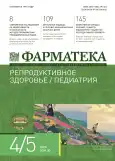Clinical efficacy of multi-dose vaccination against human papillomavirus infection in the Moscow region
- Authors: Belaya Y.M.1, Zarochentseva N.V.1
-
Affiliations:
- Moscow Regional Research Institute of Obstetrics and Gynecology
- Issue: Vol 30, No 4/5 (2023)
- Pages: 55-58
- Section: Original articles
- URL: https://journal-vniispk.ru/2073-4034/article/view/275505
- DOI: https://doi.org/10.18565/pharmateca.2023.4-5.55-58
- ID: 275505
Cite item
Abstract
Background. The effectiveness and safety of modern human papillomavirus (HPV) vaccines have been proven in numerous foreign and domestic studies and are not in doubt. However, the lack of wide coverage of 2 or 3 doses of the vaccine preparation in the world for one reason or another prompted scientists to study the effectiveness of a single-dose vaccination scheme for women of different ages. In our work, we also proved the clinical effectiveness of vaccination of patients who received 1 or 2 doses of HPV vaccine 5–14 years ago.
Objective. Comparison of the clinical efficacy of different HPV immunization regimens in young women who started a vaccination course 5–14 years ago, but for some reason did not continue it, and in patients who received a full vaccination course.
Methods. For the study, anamnestic data and clinical and laboratory research methods were used: clinical picture, PCR (polymerase chain reaction) – diagnosis of HPV of high carcinogenic risk, as well as types 6 and 11 HPV, a cytological method for examining smears from the surface of the cervix and cervical canal and colposcopy.
Results. The data of the study showed that, regardless of the number of doses of vaccines received at a young age, over time, HPV vaccine types were not detected in any of the patients. In the comparison groups, no statistical difference was found in the parameters of cytological and colposcopic examinations. The majority of patients who received one to three doses of the vaccine at a young age had subsequent pregnancies in a natural cycle with a positive outcome with the birth of healthy children.
Conclusion. Regardless of the number of doses of HPV vaccines administered at a young age, there was a positive protective effect from vaccine strains of the virus in the future, which is consistent with world data. Taking into account the opinion of WHO, a change in the approach to vaccination in favor of single- or two-dose immunization regimens, both clinically sound and more cost-effective, is expected in the near future, which is important for increasing coverage of young girls.
Full Text
##article.viewOnOriginalSite##About the authors
Yulia M. Belaya
Moscow Regional Research Institute of Obstetrics and Gynecology
Author for correspondence.
Email: belajay@yandex.ru
ORCID iD: 0000-0001-9864-2914
Cand. Sci. (Med.), Leading Researcher, Outpatient Department
Russian Federation, MoscowN. V. Zarochentseva
Moscow Regional Research Institute of Obstetrics and Gynecology
Email: belajay@yandex.ru
ORCID iD: 0000-0001-6155-788X
Russian Federation, Moscow
References
- Paavonen J., Naud P., Salmeron J., et al. Efficacy of human papillomavirus (HPV)-16/18 AS04-adjuvanted vaccine against cervical infection and precancer caused by oncogenic HPV types (PATRICIA): final analysis of a double-blind, randomised study in young women. Lancet. 2009;374:301–14. doi: 10.1016/S0140-6736(09)61248-4.
- Markowitz L.E., Dunne E.F., Saraiya M., et al. Quadrivalent human papillomavirus vaccine: recommendations of the Advisory Committee on Immunization Practices (ACIP) MMWR Recomm. Rep. 2007;56(RR-2):1–24.
- Bouvard V., Baan R., Straif K., et al. A review of human carcinogens – Part B: Biological agents. Lancet. Oncol. 2009;10(4):321–22. doi: 10.1016/s1470-2045(09)70096-8.
- Bruni L., Diaz M., Barrionuevo-Rosas L., et al. Global estimates of human papillomavirus vaccination coverage by region and income level: a pooled analysis. Lancet. Glob Health. 2016;4(7):e453–63. doi: 10.1016/S2214-109X(16)30099-7.
- Dobson S.R., McNeil S., Dionne M., et al. Immunogenicity of 2 doses of HPV vaccine in younger adolescents vs 3 doses in young women: a randomized clinical trial. JAMA. 2013;309(17):1793–802. doi: 10.1001/jama.2013.1625.
- Romanowski B., Schwarz T.F., Ferguson L.M., et al. Immunogenicity and safety of the HPV-16/18 AS04-adjuvanted vaccine administered as a 2-dose schedule compared with the licensed 3-dose schedule: results from a randomized study. Hum Vaccin. 2011;7(12):1374–86. doi: 10.4161/hv.7.12.18322.
- World Health Organization Human papillomavirus vaccines: WHO position paper, October 2014. Wkly Epidemiol Rec. 2014;43:465–92.
- Centers for Disease Control and Prevention. CDC recommends only two HPV shots for younger adolescents, October 19, 2016. Available at: https://www.cdc.gov/media/releases/2016/p1020-hpv-shots.html. Accessed Aug 15, 2017.
- Kreimer A.R., Rodriguez A.C., Hildesheim A., et al. Proof-of-principle evaluation of the efficacy of fewer than three doses of a bivalent HPV16/18 vaccine. J Natl Cancer Inst. 2011;103(19):1444–51. doi: 10.1093/jnci/djr319.
- Kreimer A.R., Struyf F., Del Rosario-Raymundo M.R., et al. Efficacy of fewer than three doses of an HPV-16/18 AS04-adjuvanted vaccine: combined analysis of data from the Costa Rica Vaccine and PATRICIA trials. Lancet. Oncol. 2015;16(7):775–86. doi: 10.1016/S1470-2045(15)00047-9.
- Safaeian M., Porras C., Pan Y., et al. Durable antibody responses following one dose of the bivalent human papillomavirus L1 virus-like particle vaccine in the Costa Rica Vaccine Trial. Cancer Prev Res. (Phila). 2013;6(11):1242–50. doi: 10.1158/1940-6207.CAPR-13-0203.
- Levin A., Wang S.A., Levin C., et al. Costs of introducing and delivering HPV vaccines in low and lower middle income countries: inputs for GAVI policy on introduction grant support to countries. PLoS One. 2014;9:e101114. doi: 10.1371/journal.pone.0101114.
- Krasnopolsky V.I., Logutova L.S., Zarochentseva N.V. Efficiency of vaccine prevention of HPV-associated diseases and cervical cancer in the Moscow region. Al’manakh klinicheskoi meditsiny. 2015;37:105–10. (In Russ.).
- Zarochentseva N.V., Belaya Yu.M. A modern view on genital warts. Possibilities of treatment and prevention. Rossiiskii vestnik akushera-ginekologa. 2017;1:109–12. (In Russ.).
- Zarochentseva N.V., Belaya Yu.M. Gynecological morbidity of girls in the Moscow region during the period of the program of vaccination against human papillomavirus infection. Doctor.Ru. 2021;20(8):23–7. (In Russ.). doi: 10.31550/1727-2378-2021-20-8-23-27.
- Human papillomavirus vaccine: WHO position paper (2022 update). Wkly Epidemiol Rec. 2022;97(50):645–72.










